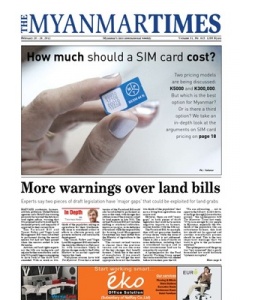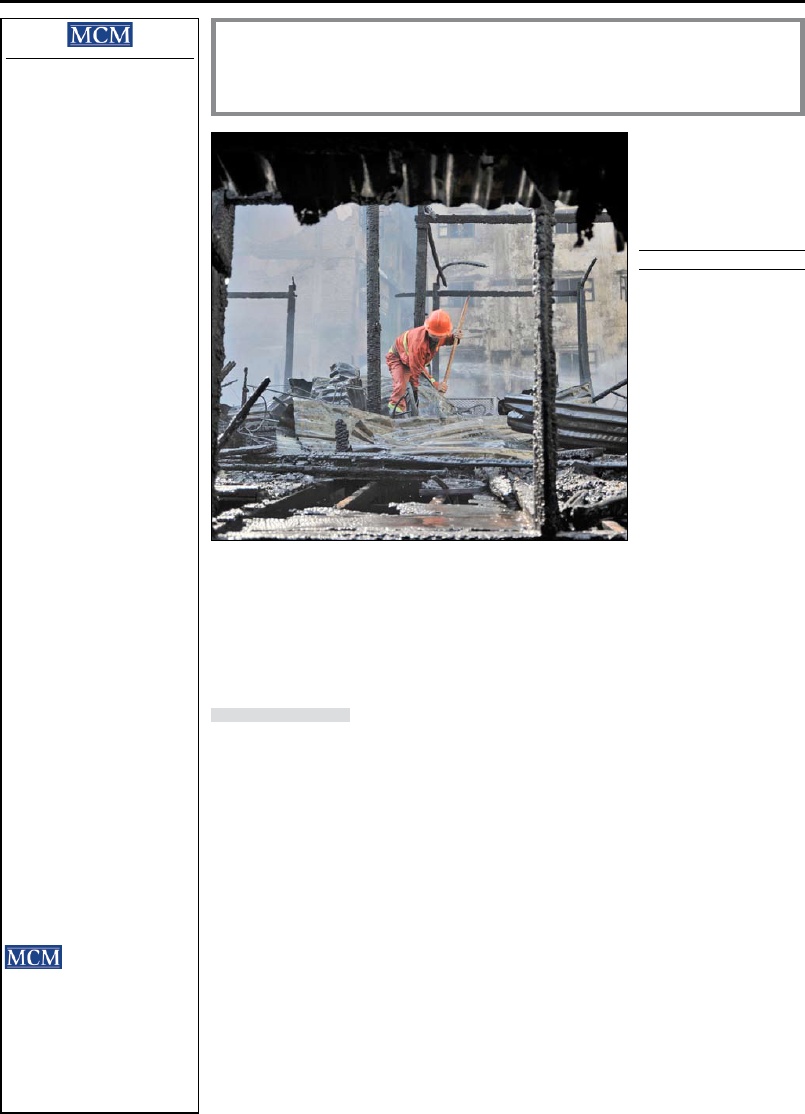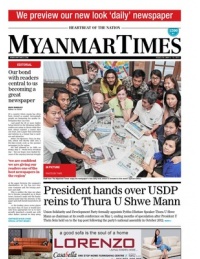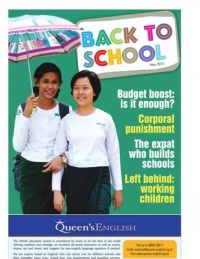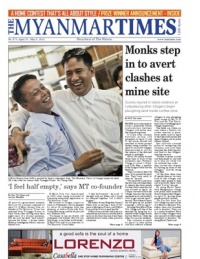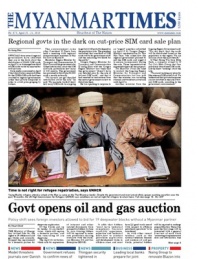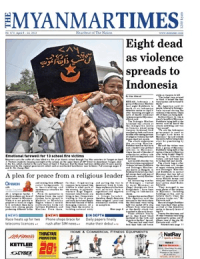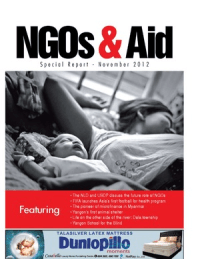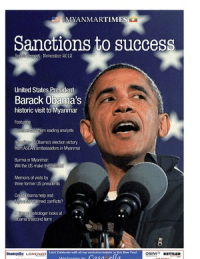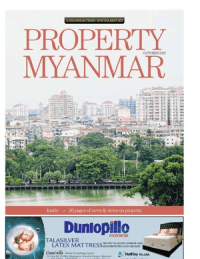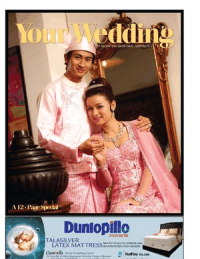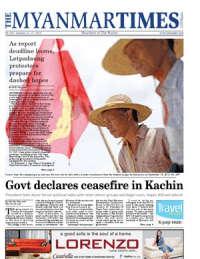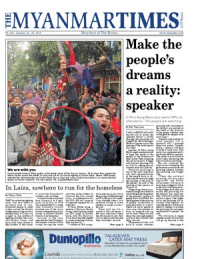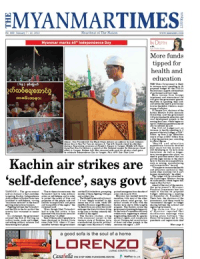myanmar
times
t H e
February 20 - 26, 2012
Myanmar’s first international weekly Volume 31, No. 615 1200 Kyats
HARVARD academics, farmers,activists, politicians, United Nationsagencies and a Nobel Prize-winningeconomist have joined the debate onland rights reform, warning thattwo proposed land laws could lead toincreased poverty and inequality if approved in their current form.The Farmland Bill and Vacant, Fallow and Virgin LandManagement Bill were submittedto parliament during the secondsession but had not been passedwhen the session ended in lateNovember. Activists and land rights expertssay the bills are inadequate andrequire further consultation, and inlate 2011 quietly began campaigningto have both of the draft lawsamended. With as much as two-thirds of the population relying onagriculture for their livelihoods,the issue is considered critical toefforts to alleviate poverty andpromote inclusive and sustainabledevelopment.The Vacant, Fallow and VirginLand Management Bill returned tothe Amyotha Hluttaw on February15, with lawmakers likely todiscuss changes made by the PyithuHluttaw to an earlier approvedversion this week.Well-places sources have told
The Myanmar Times
that a revisedversion of the Farmland Bill couldalso be submitted to parliament assoon as this week, with changes thataddress some of the concerns raisedby land experts in late 2011. Therevised Farmland Bill now includesshifting or rotational cultivation,known as
taungya
, in its definitionof farmland, while the responsibilityfor forming Land ManagementCommittees has been shifted fromthe Ministry of Agriculture to theCabinet.“The current revised versionis clearer than the previousversion and we can see someof the key changes that benefitfarmers. I think this is the resultof consultation. If you consultrepeatedly, you will get the mostappropriate farm law that benefitstwo-thirds of the population” thatearn a living from agriculture, onesource said.However, there are still “majorgaps” in both pieces of draftlegislation that could have seriousnegative impacts on farmers,sources familiar with the bills say.The Farmland Bill, for example,does still not guarantee freedomof crop choice, while the issue of customary law is not addressed.There is also a lack of clarity onsome definitions, including whatis considered
taungya
and inwhat circumstances land can becompulsorily acquired. A spokesperson for the FoodSecurity Working Group agreedthat more consultation was neededbefore lawmakers pass the bill.“We are advocating … not toapprove the bill now, to slow down,to really go through [a] consultationprocess,” the spokesperson told
The Myanmar Times
last week.“If we care enough for our peoplein Myanmar, especially the two-thirds of the population who aresubsistence farmers, this landlaw should not be approved andanother consultation processshould be used. This is the veryimportant message that wewant to give to the parliamentmembers.”The spokesperson said the groupwas “very concerned” that a poorlyformulated law could facilitate“systemic corruption”.
More warnings over land bills
More page 4
Experts say two pieces o drat legislation have 'major gaps' that could be exploited or land grabs
How much
should a SIM card
cost?
Two pricing modelsare being discussed:
K5000
and
K300,000
.But which is the bestoption or Myanmar?Or is there a thirdoption? We take anin-depth look at thearguments on SIM cardpricing on
page 18
Pic: Yadanar
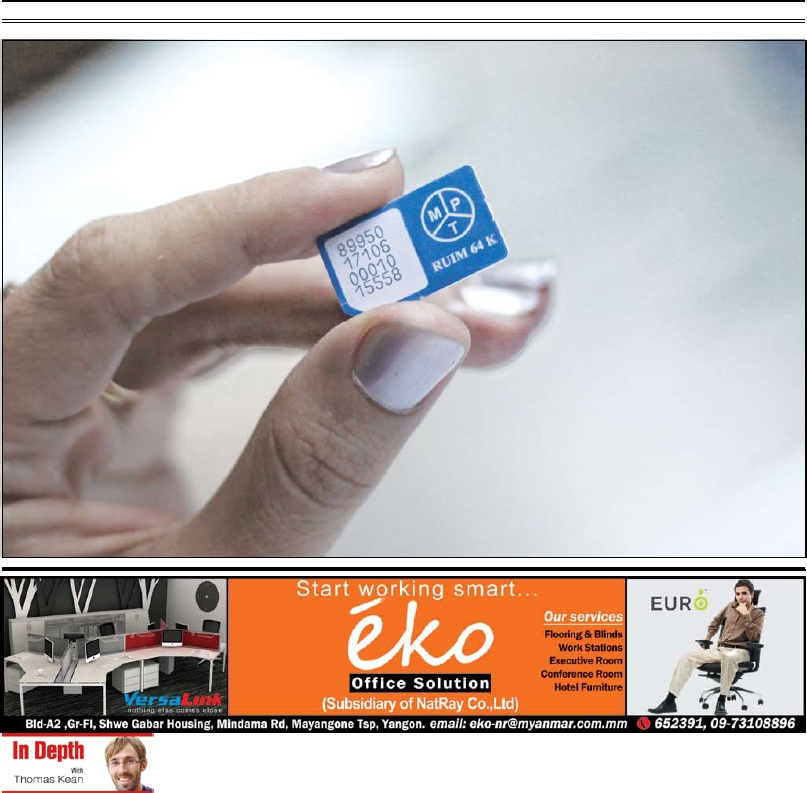


C
omment
the
M
yanMar
t
iMes
2
February 20 - 26, 2012
By Ben White
WITH a renewed focus oneconomic development and job creation, managingurban growth poses a majordevelopment challenge, aswell as opportunity for thegovernment, a United Nationsofficial says.Given the country’s abundantnatural and human resources,liberalisation of the economy willhave immediate implications forurbanisation, said Mr SrinivasaPopuri, the country manager of UN-HABITAT.“The negative aspects of urbanisation like environmentalpollution, urban poverty,congestion and increasedvulnerability to disasters aremore or less well-recognised.It is the positive aspects of urbanisation like its job creatingpotential and the role it playsin integrating rural economieswith the national economythat need fuller recognition inthe development of policy andprograms,” said Mr Popuri. Although their capacity iscurrently low, he felt that thegovernment was “aware of thechallenges and what needs tobe done, but external supportfor urban issues is very limitedso far”.“We are expecting a hugeboom in the construction sector.The government will need toensure that all constructionsmeet safety standards forwhich, among other things,construction workers willhave to be given appropriatetraining.”He said that cities indeveloping countries aregrowing rapidly without thecorresponding expansion of infrastructure and services,partly because there is no viablesystem of financing urbanexpansion in place. And the consequences of thiscan be seen close to home, in theform of floods that devastatedBangkok late last year.“When you build on floodplains, where does the watergo? This shows the need to guideprivate investments with a longerterm and wider perspective inmind,” said Mr Popuri.In downtown Yangon,water often reaches kneeheight during rainy season,affecting businesses andresidents. Without adequateintervention, these and otherplanning problems are likelyto grow as the city expands. Yangon is already spreadingquickly outwards, with growingnumbers of urban poor livingin areas lacking sufficientinfrastructure and services.To address such issues,the Department of HumanSettlement and HousingDevelopment under theMinistry of Construction hasestablished an Urban Researchand Development Institute(URDI) with the support of UN-HABITAT that signalled closercooperation. At the opening of the institute,UN Resident and HumanitarianCoordinator, Mr Ashok Nigam,welcomed the fact that “theMinistry of Constructionand UN-HABITAT signed amemorandum of understandingonly in September 2011 and yet,in a short period of time thenew and unique partnershiphas been able to commenceimplementation of all fourcomponents of the agreedprogram for safer settlementsand urban research”.“There now exists a clearwindow of opportunityto promote and strengthencollaboration between the UN,the government and relevantpartners fro the socio-economicprogress of Myanmar,” he said.Mr Popuri also said thecivilian government has beenbetter at coordinating policiesthan its predecessor and wasalso more willing to discusspreviously off-limits topics, suchas poverty.The establishment of theinstitute marks a change incourse for UN-HABITAT. Whilethe agency was involved in theresponse to Cyclone Nargis,more recently it has focusedon technical assistance andcapacity building, for exampleby assisting the governmentto work on a set of NationalBuilding Codes and subsequentformulation of a legal frameworkto ensure safe design andconstruction of buildings andsafer settlements.“We soon realised that thiswas not enough; there is a needfor training, research, capacitybuilding to deal with the manyaspects of urbanisation. Youneed a holistic approach. Thisis what we are doing withthe institute, preparing thegovernment to avert an urbancrisis,” Mr Popuri said, addingthat capacity remains a vitalissue.“In Myanmar there aremany trained engineers andtechnicians, but planners aremissing. However, it is easierto make a planner out of anengineer, so there is potential.”The institute also providesthe government with the meansto secure greater internationalsupport and funding inaddressing its developmentchallenges, with much of the financial support for theinstitute so far provided byNorway.“With the establishmentof URDI, the Ministry of Construction is in a betterposition to introduce a moreinclusive and coordinatedapproach to urban planning,”Mr Popuri said,“This long term interest is toprovide Myanmar with the toolsto cooperate with internationalfunding organisations, WB, ADB, IMF etc. Because if yourdata is not in order, it makes itharder to negotiate loans withouttheir interference. Donors don’tlisten to advocacy, you needto prove it with research andevidence based data.”
By Thomas Kean
A BASIC tenet of good governance is transparency,and for many years this has been sorely lackingin Myanmar. However, since President U TheinSein’s government took office last year, Myanmarhas seen some incremental improvements inthis regard. Positive developments include morefrequent press conferences and briefings byministers and other government officials; thedebate over the budget and public disclosureof budget figures; and the decision to allow journalists into the parliament. Reducedcensorship has led to greater scrutiny of boththe public and private sectors, which can onlybenefit the country in the long-term.But while journalists have been allowed intothe hluttaws, and their reporting from Nay PyiTaw has gone largely uncensored, more needsto be done to improve transparency in thisimportant public institution.Many crucial laws – laws that have thepotential to define the country’s politicaland economic future – are being drafted anddebated. Unfortunately, however, this debate isbeing confined to the chambers of the nationallegislatures because drafts are not being releasedto the public in a coordinated and transparentmanner. Some drafts are widely circulated byrepresentatives and parliamentary committees,and there are many cases where laws have beendrafted in consultation with stakeholders, suchas the publishing law and labour law. However,this process is haphazard and unpredictable: just as many bills are not distributed beforepromulgation, with the public largely in the darkabout their contents. The many different – andin some cases wildly divergent – figures beingpublished in regards to the 2012-13 nationalbudget are but one example of the problemsthat arise when there are no definitive sourceson which to rely. All eligible citizens are able to electparliamentarians to represent them inparliament. But it is important that everyoneis also given the chance to directly contribute tothe law-making process. More opportunities forMyanmar and international experts to providevaluable input will result in better laws, improvetrust in the lawmaking process, and ensure newlegislation meets the needs of the people, not thevested interests of a particular group.On International Democracy Day last year, Amyotha Hluttaw Speaker U Khin AungMyint pledged that “the hluttaw will take intoconsideration all voices of the entire peoplewho are not in the hluttaw to the most possibledegree”. Pyithu Hluttaw Speaker Thura U ShweMann has also regularly said that the decisionsof the hluttaw must reflect the will of the people.However, without a transparent process thatenables all Myanmar citizens to access draftsof legislation and then make a submission onhow they believe the draft should be amended, itcannot be said with certainty that the hluttawsreally are considering the voices of all people.This process is standard practice in manycountries around the world and is not onlyessential for achieving good governance butis also considered an important aspect of democracy. It should also not be confined tolegislation. The transcripts of parliamentaryproceedings, and possibly even parliamentarycommittee meetings, should be publishedand made widely available through all formsof media – print, broadcast and online – in avariety of languages. While state television hasaired parliamentary discussions at length, theseare edited rather than broadcast live.Myanmar’s democracy is new and a fewteething problems are to be expected. However,it is important to not be complacent. Thereis no finish line for democracy; it requiresconstant fine-tuning and can also deteriorate if not given the attention it deserves. Improvingtransparency and inclusiveness in the legislativeprocess would not cost a great deal of moneybut would be a significant step forward for thedemocratisation process.(
Thomas Kean is editor of the English-language edition of
The Myanmar Times
. Hecan be contacted on tdkean@gmail.com.
)
Managing urbanisation keydevelopment challenge: UN
Time to liftveil of secrecyin parliament
The Mail Box
Got something to say? We want to hear from you. Address all correspondence to the Editor,
The Myanmar Times
(English). We endeavour to respond to all cor-respondencei n a timely manner.Address: 379-383, Bo Aung Kyaw Street, Kyauktada township, Yangon. Telephone: (+951) 392-928, 253-642. Fax: (+951) 392-706Email: your.myanmar.times@gmail.com
Dear Editor,I agree with U Zaw Zaw, president of theMyanmar Football Federation (MFF), fornot allowing Ba Htoo Stadium to be used asa venue for Daw Aung San Suu Kyi’s politicalcampaign in Mandalay. But I would like topoint out one thing: Everyone is equal beforethe law and no one is above the law, right?Therefore, the MFF and chief ministersof all 14 states and regions should issue anotification that all football stadiums inMyanmar will not be used for large publicgatherings, not only political campaigns.“Yes we can” will only come true when weall have equal opportunities.Nyunt AungDear Editor,I read with interest your article in thesports section of the January 30-February5 edition of
The Myanmar Times
, “Fansask for more from MRTV-4”.While broadcasters should beencouraged to continually improve thequality of their coverage, comparingbroadcasts of the Myanmar NationalLeague with those of the EnglishPremier League or La Liga in Spainis a bit unfair to say the least. This isclear when you compare the amountMRTV-4 paid for the broadcast rights– K500 million, or about US625,000 in2012 – with those leagues – the EnglishPremier League earns billions of dollarsselling its broadcast rights.Perhaps a better comparison wouldbe with the previous MNL broadcaster,MRTV, and frankly MRTV-4 blows thestate-run channel out of the water.It’s got more than one camera at theground, it has slick graphics, its shotsare usually in focus and it even showsreplays of key moments in the match.Frankly, I don’t know how MRTV-4will be able to recoup the money they’veinvested in buying these rights and theyshould be applauded for supportingMyanmar’s first professional footballleague.Kyaw,Bahan
Opinion
Yangon residents aboardthe circle line train inSouth Okkalapa township.Managing growth in thecity is a key developmentchallenge, the UN says.
Pic: Christopher Davy
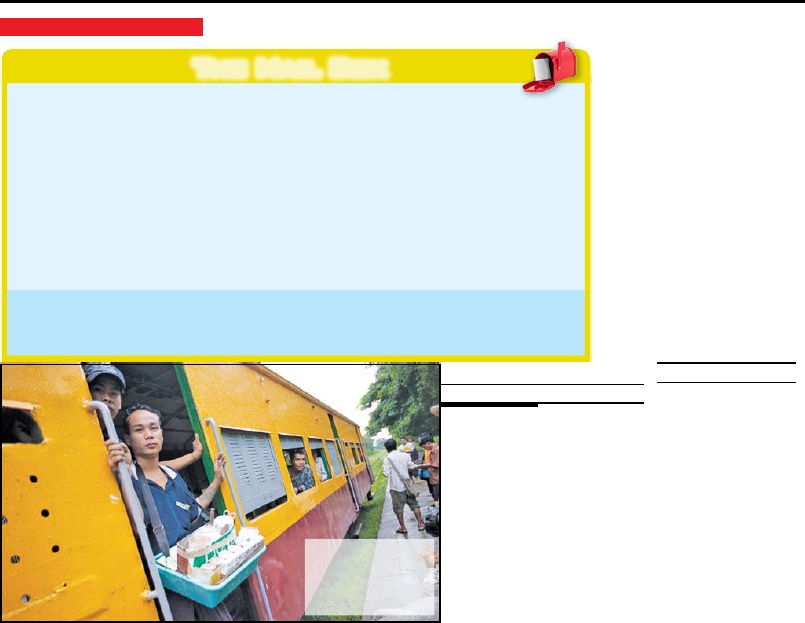




n
ews
3
the
M
yanMar
t
iMes
February 20 - 26, 2012
By Soe Than Lynn
UNION ElectionCommission chief U Tin Ayehas told representatives of parties contesting the April1 by-elections that theyshould act as a “check andbalance” on each other toensure that voting is fair.He also reaffirmed thecommission’s independencefrom all of the partiescontesting the by-elections.“They explained the dutiesof the election commissionat the meeting and seriouslylistened to advice from partyrepresentatives,” said NewNational Democracy Partychairman and PyithuHluttaw representative UThein Nyunt.“Commission chairman UTin Aye told us that partiesshould act as a check andbalance against each otherto make sure the by-electionsare free and fair. He alsosaid that the commissionwill not favour any partyand will be in conformitywith the rules.”The chairs and secretariesof 17 parties that haveregistered candidatesfor the by-elections wereinvited to Nay Pyi Taw forthe February 14 meeting,which came after repeatedvows from Pyithu HluttawSpeaker Thura U ShweMann that the by-electionswould be free, fair andcredible.U Thein Nyunt said thecommission had outlined a“three-step” plan to ensurethe by-elections met thesecriteria.“As a first step, theymet with region and stateelection commissions.Meeting political parties isthe second step. Next theywill meet with personnelfrom departments whowill participate in holdingthe by-elections, includingMinistry of Home Affairs,”he said.U Tin Aye also told politicalparties that if illegal andwrongful acts occurred theyshould be reported to thecommission, which wouldthen take legal action.“Regarding thecommission chairman’sguidance, I believe thatif the parties and peoplecooperate there is sure to bea free and fair election.”U Sai Hsaung Hsi, vicechairman of the ShanNationalities DemocraticParty, said he expected theby-elections would be “muchfairer” than the November2010 general election.“Commission chairman UTin Aye himself promisedthat the forthcoming by-elections would be free andfair, [improving] on theweaknesses of the 2010election,” he said.NLD chairwoman Daw Aung San Suu Kyi wasunable to attend butsecretaries travelled to NayPyi Taw in her place.
– Translated by Thit lwin
UEC chief tells partiesto reportelectionviolations
THE third session of the Yangon Region Hluttawbegan last week, withopposition representativesagain calling for Yangon CityDevelopment Committee toimprove services.U Kyaw, the representativefor Thingangyun 1, saidspeaker U Sein Tin Winhad told parliamentariansthe session would rununtil February 21, longerthan the second session inNovember, which lasted justfour days.“There are more billsfrom representatives thanthe previous session so thenumber of sitting days ishigher. But the speaker alsosaid that they will not havetime to hear all the bills thathave been proposed,” said UKyaw, of the New NationalDemocracy Party.He said the main issuefor discussion would bethe Yangon Region budgetfor the 2012-13 fiscal year,which is expected to featurea large deficit.“The budget issue isimportant but we don’t yethave detailed figures soDaw Khin San Myint [alsofrom the New NationalDemocracy Party] and Idon’t plan to discuss thebudget during this session,”U Kyaw said.Most of the bills heardrelated to YCDC, with UKyaw and Daw San SanMyint, the representative forThingangyun 2, submitting abill calling for the committeeto renovate the retainingwalls of Ngamoeyeik Creekto prevent flooding.“In his reply, the YangonMayor just talked generallyabout what the committeewas doing about drainage in Yangon, he didn’t give anypromise about [the retainingwall]. But the speaker, USein Tin Win, said it shouldbe done and put it on record,”U Kyaw said.He said that in Augustareas of Thingangyun andNorth Okkalapa townshipshad suffered flooding becauseof the lack of a retaining wallbeside the creek.In November, U Kyawsubmitted a bill that wouldhave required YCDC toprovide an adequate supplyof clean water to all homes inthe municipal area. The billwas voted down 98 to 122 butthe speaker said provision of water should be a priorityfor the committee.Some laws were alsoamended last week toincrease fines for breachesof municipal laws.“I asked the YangonMayor that if the committeeis going to raise fines topunish those that break YCDC laws, what will itdo to punish YCDC officersthat commit corrupt acts,”U Kyaw said. Yangon Mayor U HlaMyint replied that thecommittee would ensurethat its offices do not commit“serious” breaches of thelaw.
– Kyaw Hsu Mon
YangonHluttawsessionbegins
By Maung Thway Thit
ONE of Daw Aung San Suu Kyi’sopponents in the seat of Kawhmu hasvowed to appeal against the electioncommission’s decision to throw out hisobjection to her candidacy. Yangon Region Southern DistrictElection Sub-commission chairmanU Myat Soe confirmed on February15 the commission had rejected anobjection from U Tin Yi of the Unityand Peace Party.“We have already informed U Tin Yi.He said he would file an appeal. So wehave given him the order and he willproceed,” U Myat Soe said.“[On February 14] the list of candidates was announced butKawmhu is pending because we arewaiting for him to file the appeal. Wewill announce [the candidate list] afterthe outcome is known,” he said, addingthat an appeal would have to be filedwithin seven days.U Myat Soe said the Yangon RegionSub-commission would judge theappeal and its decision would befinal, with no further opportunitiesto appeal.U Tin Yi submitted the objectionon February 6, arguing that Daw Aung San Suu Kyi was not eligibleto stand as a candidate because shecontravened section 10(g) of the PyithuHluttaw Election Law, which barsanybody “entitled to enjoy the rightsand privileges of a subject of a foreigngovernment or a citizen of a foreigncountry”.In his letter of complaint, U Tin Yialso said she had received cash prizesfrom more than 100 internationalawards and these had not yet beentransferred to a bank in Myanmar. Healleged that she accepted grant moneyfrom overseas organisations and that aperson from the United States namedPhilip Robertson had secretly sentUS$80,000 more than a decade ago.Under section 10(h) of the PyithuHluttaw Election Law, anybody“who obtains and utilises directly orindirectly the support of money, land,housing, building, vehicle, property… from any individual of a foreigncountry” is barred from running as acandidate.U Tin Yi also questioned whetherDaw Aung San Suu Kyi was aMyanmar citizen.U Myat Soe said U Tin Yi hadsubmitted articles published in 1999and 2000 and transcripts of pressconferences as evidence to back uphis claim.But the commission decided therewere no grounds for barring Daw Aung San Suu Kyi from running forparliament.“[U Tin Yi] raised his objection basedon receiving perks from a foreigngovernment and doubts about hercitizenship, citing articles from about2000 as evidence. The commissionchecked all of these and then concludedthat they are not in agreeance with thecurrent situation,” he said, withoutelaborating.Myanmar was in “a new era” andU Tin Yi’s accusations “are related tothe period before the constitution wasintroduced”.“It is obvious that Daw Aung SanSuu Kyi is a citizen. She has lived inMyanmar for more than 20 years. Shelives in her own house. She possessesa [national] registration card. There isnothing suspicious.“We are also not aware of whethershe is entitled to perks of a foreigngovernment or [received funds froma] foreigner. When we asked herabout it, she said no. We took herstatement as a reference. We don’thave any idea whether there is anyinformation on this made public bygovernment departments. We have just considered [the objection] basedon her statement,” he said.However, the section of the PyithuHluttaw Election Law regarding thoseineligible to stand for election doesnot grant exemption for activitiesor events that occurred before theconstitution was adopted. Before the2010 election, some candidates weredeclared ineligible under section 10because at least one of their parentswas not a Myanmar citizen.Had the commission upheld theobjection, it would have created asignificant headache for President UThein Sein’s government, which hasworked hard to bring Daw Aung SanSuu Kyi and the National League forDemocracy into the electoral process.But U Myat Soe said no pressurehad been exerted on the commissionto reject U Tin Yi’s objection.“There is nothing to prove but thedescriptions in the articles, so werejected it,” he said. “We didn’t need toget verification from the upper levelsconcerning this case. Nobody exertsinfluence on us.”Regarding the objection, NLDspokesperson U Nyan Win said itcame as “a surprise”.“U Tin Yi’s accusations do notconform with the law and are false,” hesaid. –
Translated by Thit Lwin
EC throws out objectionfiled against NLD leader
Daw Aung San Suu Kyi campaigns in Yangon Region’s Kawhmu township on February 11.
Pic: Kaung Htet
‘
The commissionchecked all o theseaccusations and thenconcluded that they arenot in agreeance withthe current situation.
’
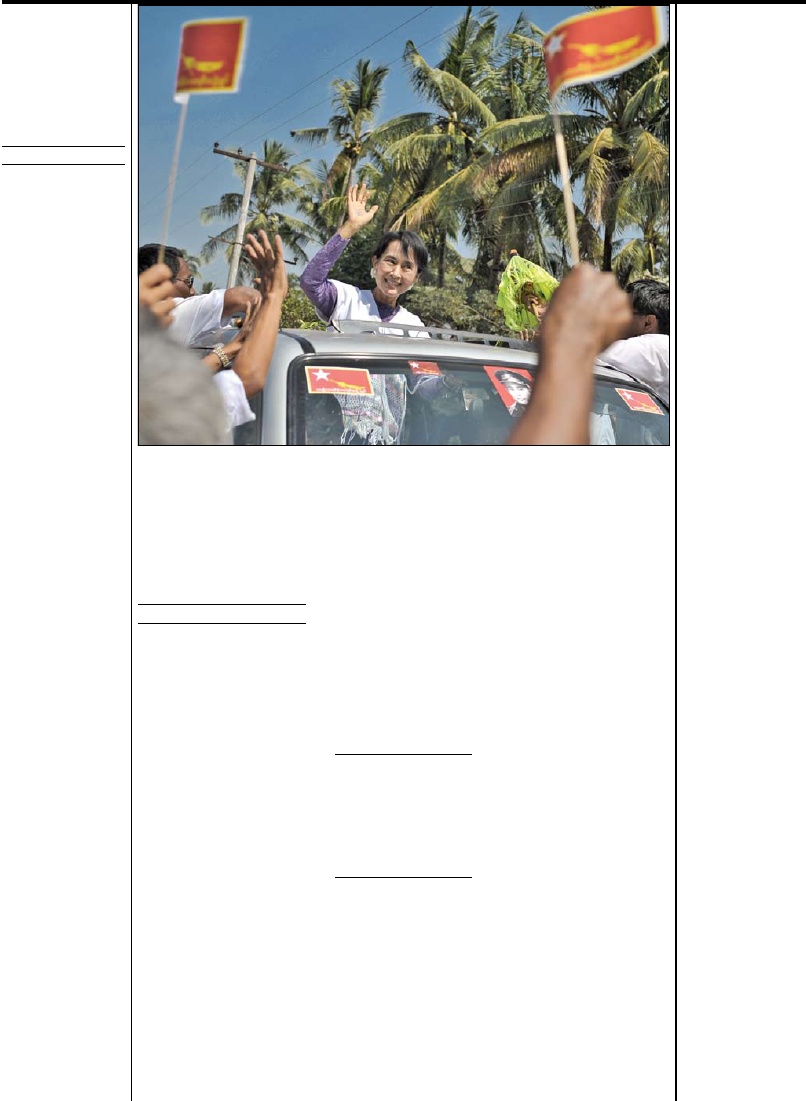

検索履歴:
結果00中00
00結果次の結果
p.
Notes
Post Note
